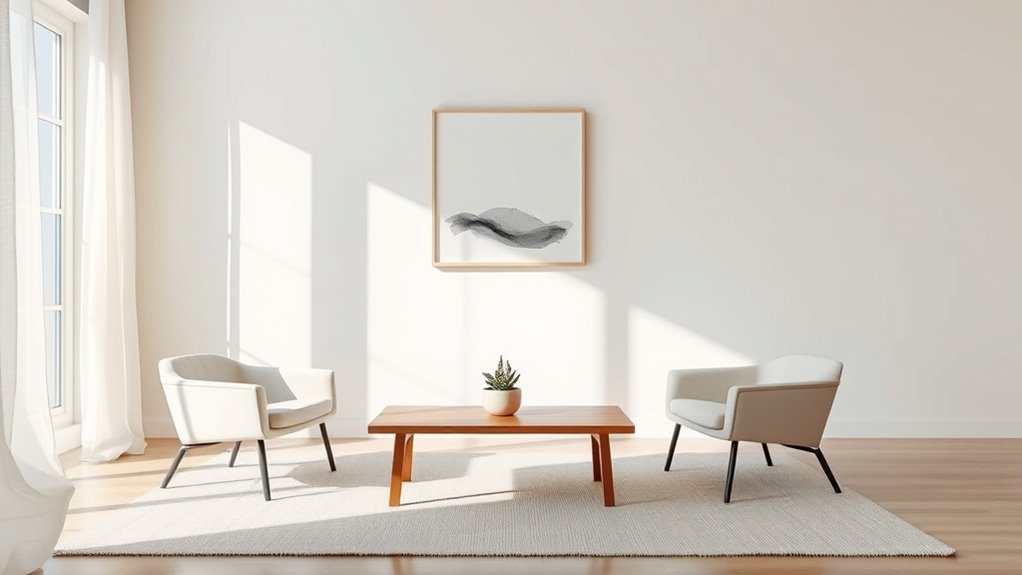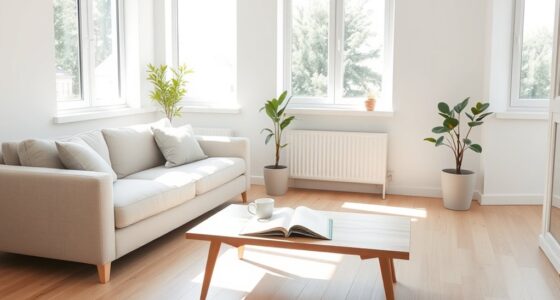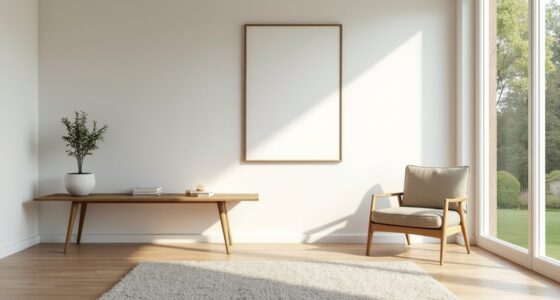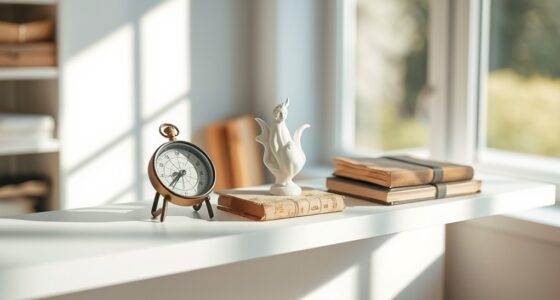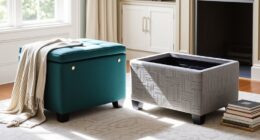Minimalism is your secret weapon for a stress-free home. By reducing clutter, you lower stress and create a peaceful environment. A simplified space enhances your focus and boosts productivity, allowing for clearer decision-making. With mindful consumption, you prioritize quality over quantity, supporting a more sustainable lifestyle. The emotional clarity that comes from minimalism fosters deeper fulfillment and enjoyment in your life. Discover how to transform your home into a calm sanctuary with these insights.
Key Takeaways
- Minimalism reduces clutter, which lowers stress and anxiety levels, fostering a peaceful home environment.
- A simplified space enhances focus and productivity by minimizing distractions and cognitive overload.
- Decluttering encourages mindful consumption, leading to deeper fulfillment with fewer possessions.
- Creating an organized atmosphere improves mental clarity, aligning with self-care and healthier habits.
- Minimalism promotes efficient resource use, supporting sustainable living and reducing environmental impact.
The Connection Between Clutter and Stress
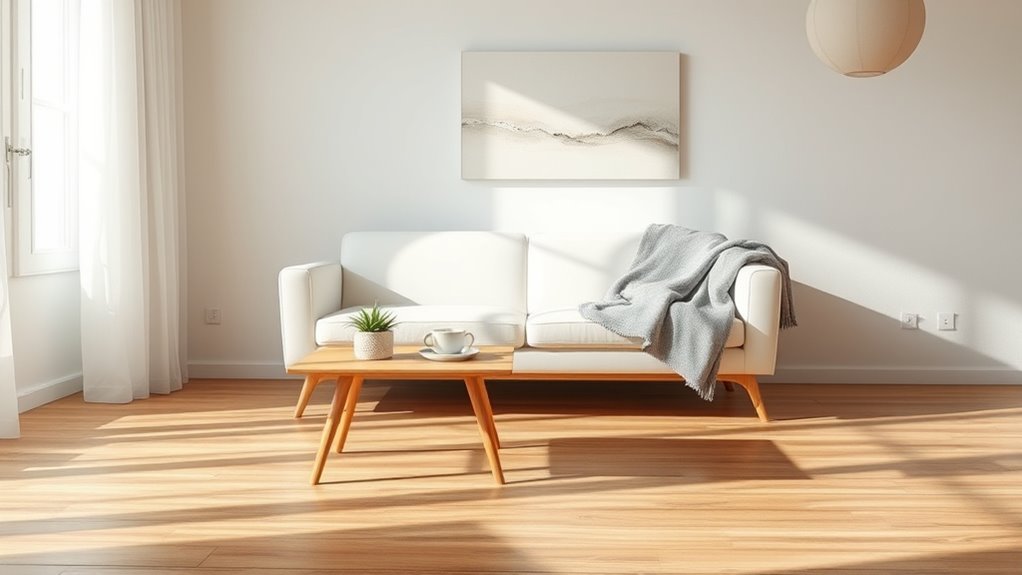
When you look around your space, clutter might be more than just a visual nuisance; it can actually elevate your stress levels. Studies show that clutter increases cortisol levels, particularly in women, heightening stress. Embracing minimalist environments can help mitigate these effects by promoting relaxation and clarity.
Clutter isn't just messy; it can raise stress levels and increase cortisol, especially in women.
As you manage household organization, the mental load can feel overwhelming, leading to cognitive overload. This visual chaos distracts your brain, impairing focus and productivity. It can even evoke emotional turmoil, especially if tied to deeper psychological issues. Disorganized environments lead to distraction and decreased productivity, making it even harder to find a sense of calm.
The physiological effects, like increased salivary alpha-amylase, indicate rising stress in chaotic environments. Simply put, clutter creates a cycle of stress and anxiety, impacting your overall mental well-being.
Recognizing this connection is the first step toward creating a healthier, more peaceful living space.
Creating a Calm and Organized Space

Creating a calm and organized space starts with intentional decisions about what you keep and how you arrange it. Tackle decluttering one room at a time to avoid feeling overwhelmed. Use an outbox for items you're unsure about, giving yourself a few weeks to decide their fate.
In the kitchen, donate unused spices and non-perishable items to maintain a minimalist pantry. Maximize vertical space with wall-mounted storage and incorporate furniture with hidden storage to keep surfaces clear. Utilizing effective storage solutions can help ensure you're making the most of your available space. Consider using portable camping toilets for outdoor gatherings to keep your space tidy and comfortable.
Utilize storage containers, drawer dividers, and labeling systems to categorize and organize your belongings. Embrace open shelving for visibility, and consider pegboards or hooks for easy access.
Regularly revisit your space to maintain that calm, organized atmosphere.
Emotional Clarity Through Minimalism
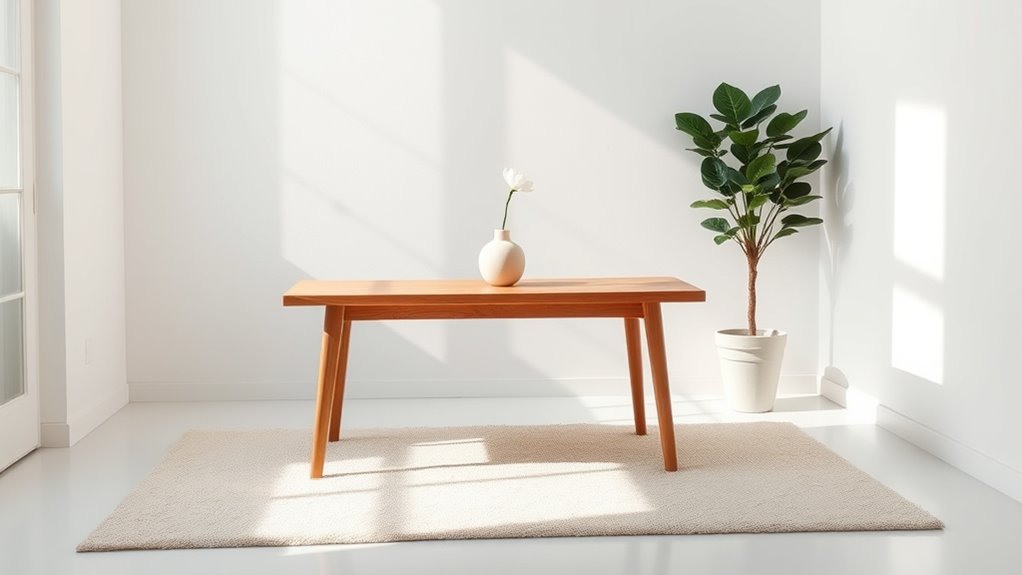
A calm and organized space not only sets the stage for tranquility but also paves the way for emotional clarity through minimalism.
By reducing clutter, you lower stress and anxiety, allowing for a more peaceful mindset. Minimalist environments encourage mindfulness, helping you appreciate what truly matters in life. As you simplify your possessions, you enhance self-awareness, identifying what adds true value and emotional fulfillment. This process fosters emotional healing, giving you a calming space for reflection. Furthermore, the clutter-stress connection shows that creating a serene environment can significantly improve your mental clarity and overall well-being. Additionally, embracing smart shopping practices can help you acquire only what you truly need, further supporting a minimalist lifestyle.
Ultimately, embracing minimalism leads to increased joy and tranquility, shifting your focus from material possessions to meaningful experiences.
You'll find that prioritizing simplicity enriches your emotional well-being and cultivates a more fulfilling life.
Enhancing Focus in a Simplified Environment

While you mightn't realize it, your environment plays a crucial role in your ability to focus. A decluttered space minimizes distractions, making it easier for you to concentrate on tasks at hand.
Studies show that adopting minimalism significantly boosts productivity. With fewer items vying for your attention, you can make clearer decisions and manage your time more effectively. Additionally, embracing minimalism's benefits can lead to decreased stress, further enhancing your ability to focus. This aligns with the principle of like attracts like from the Law of Attraction, suggesting that a positive mindset can be nurtured in a serene environment.
Moreover, a simplified environment can spark your creativity by reducing cognitive clutter. When you strip away the unnecessary, you create room for innovative ideas and solutions.
Ultimately, embracing minimalism not only enhances your focus but also cultivates a sense of mental clarity, allowing you to engage more fully in your work and pursuits.
Promoting Peace With Intentional Living Areas

Your living space has the power to influence not just your focus but also your overall well-being. By embracing minimalist design, you can simplify your areas, fostering a calm atmosphere that invites relaxation. Incorporating natural elements like wood and stone adds warmth, while open spaces allow for easy movement and a sense of tranquility. Opting for neutral color palettes and purposeful decor enhances this intentional living experience, making every piece meaningful. This environment encourages quality time with loved ones, promoting mindful interactions and deeper connections. By integrating nature through indoor plants, you invite serenity into your home, ultimately creating a peaceful sanctuary that nurtures your emotional well-being and enhances your daily life. Additionally, embracing slow living helps you prioritize what truly matters, making your space a reflection of your values and beliefs. The use of natural materials in decor not only elevates the aesthetic but also fosters a sense of authenticity within your home.
The Impact of Minimalism on Physical and Mental Health
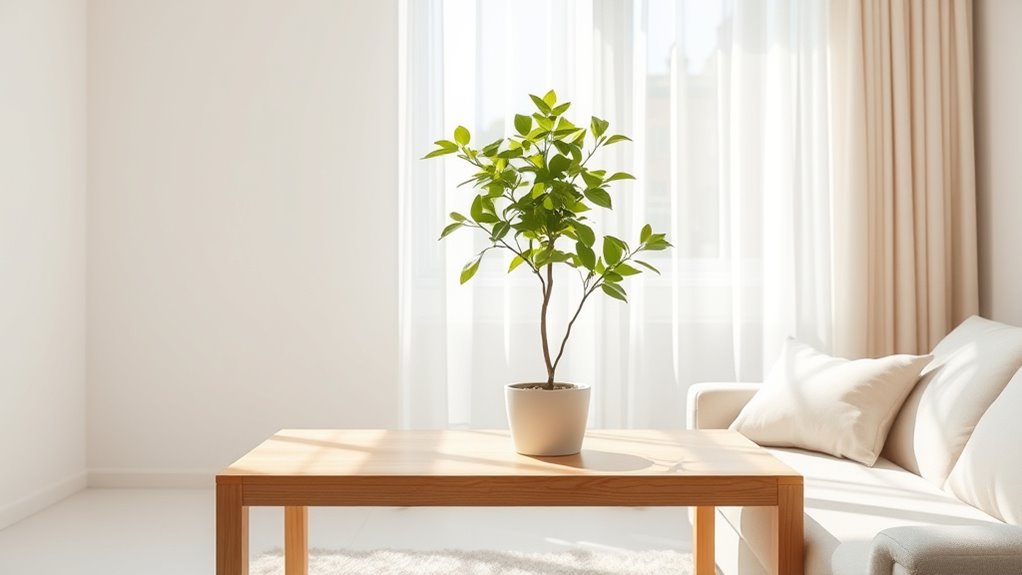
Minimalism significantly impacts both physical and mental health by creating an environment that promotes well-being and clarity.
By removing clutter, you reduce stress and anxiety, leading to improved mental clarity. You'll also experience increased positive emotions, such as joy and peacefulness, as you align your life with your values. A clutter-free space enhances your focus and productivity, minimizing distractions. Additionally, minimalism encourages contentment with fewer possessions, which can lead to a deeper sense of fulfillment. This approach aligns with holistic approaches to health and wellness, emphasizing the importance of nurturing both mind and body.
Moreover, minimalism fosters mindfulness, helping you appreciate your experiences over possessions. Physically, living in a simplified environment can improve sleep quality and lower cortisol levels, boosting your mood and cognitive function.
Prioritizing self-care becomes easier, and you might even find yourself more active and focused on healthier eating habits. Embracing minimalism can truly transform your overall health.
Streamlining Daily Routines for Efficiency
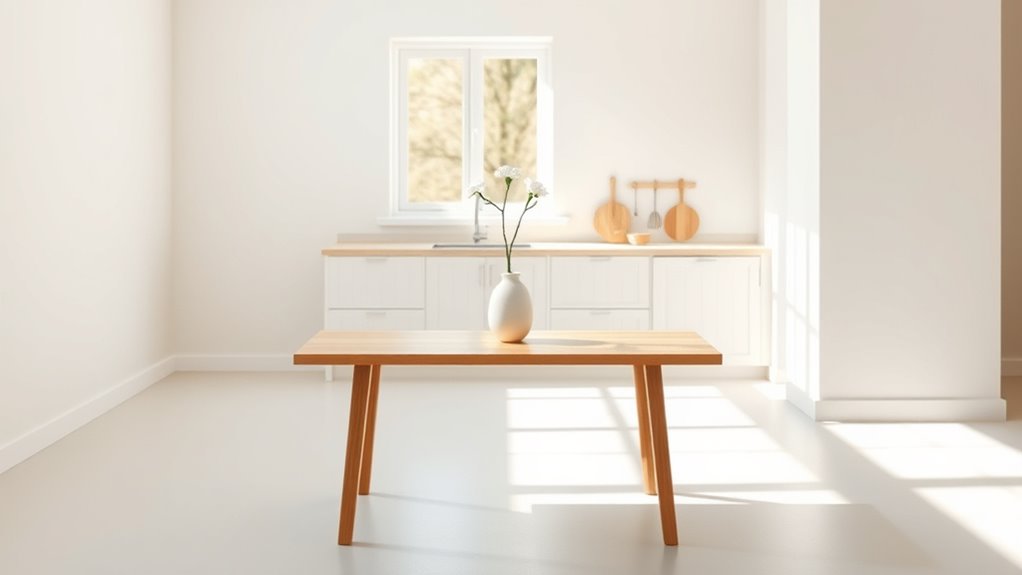
Streamlining daily routines can drastically improve your efficiency and overall well-being. Start by organizing your workspace; a clutter-free area boosts your focus and productivity. Organizing your workspace can significantly enhance your ability to concentrate on tasks without distractions. A well-arranged home can create a sense of cozy living that fosters relaxation and encourages productive habits. Prioritize tasks using tools like the Eisenhower Box to differentiate between what's urgent and important. Establish a morning routine that includes exercise or meditation to kickstart your day with energy.
Limit multitasking; concentrating on one task at a time reduces errors and enhances performance. Automate repetitive tasks whenever possible to save time. Consider time-blocking methods for task allocation and try the Pomodoro Technique for sustained concentration. Daily planning and weekly reviews can refine your approach, ensuring that you stay on track and continuously enhance your efficiency.
Embrace these strategies for a more streamlined and stress-free daily life.
Mindful Consumption and Its Benefits
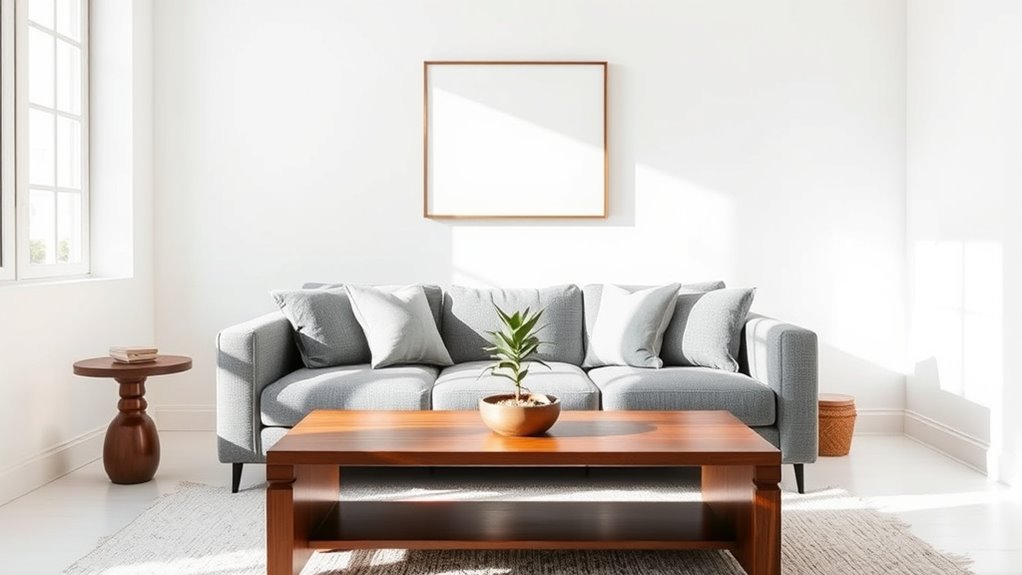
As you navigate through a world filled with endless choices, embracing mindful consumption can transform your relationship with what you acquire and consume.
By focusing on quality over quantity, you'll make conscious decisions that align with your values, reducing stress and enhancing mental clarity. Additionally, recognizing the impact of digital choices allows you to curate your experiences more effectively, promoting positive engagement with information.
Focusing on quality over quantity cultivates conscious choices, aligning with your values and promoting mental clarity.
Curating your digital experiences helps you avoid negative content, allowing you to engage more meaningfully with the world around you.
This intentionality not only improves your focus but also fosters better relationships as you become more present.
Taking regular media breaks increases your productivity and boosts self-esteem by minimizing unhealthy comparisons.
Ultimately, mindful consumption empowers you to appreciate what truly adds value to your life, leading to a more peaceful and fulfilling existence.
Building a Sustainable Lifestyle Through Minimalism
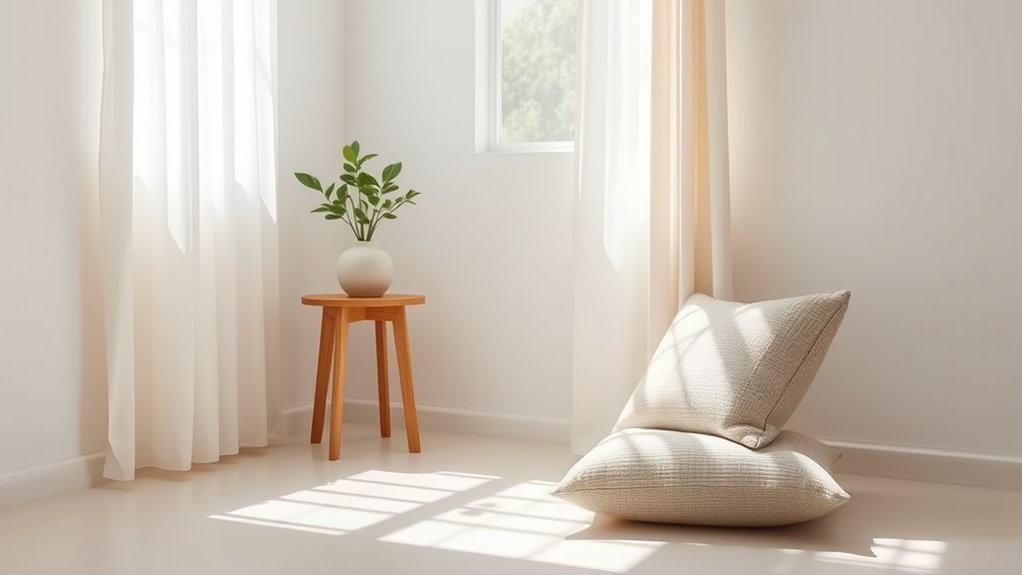
Embracing mindful consumption not only enhances your mental clarity but also lays the groundwork for a sustainable lifestyle.
By reducing your consumption, you lower the demand for new products, which decreases manufacturing emissions and environmental degradation. Owning fewer items means less waste, promoting conservation and a healthier planet. Moreover, this approach promotes sustainable living by encouraging you to choose quality items over quantity. The rise in popularity of clean beauty products reflects a growing consumer preference for non-toxic ingredients that are better for both personal health and the environment.
When you choose eco-friendly products made from sustainable materials, you further minimize your impact.
Minimalism encourages efficient resource use, cutting down on unnecessary purchases and waste. Investing in durable, long-lasting items means you won't need frequent replacements, supporting sustainability.
Ultimately, adopting minimalism not only creates a clutter-free environment but also aligns your lifestyle with eco-friendly practices, fostering a more sustainable and fulfilling way of living.
Frequently Asked Questions
How Can I Start My Minimalism Journey Today?
You can start your minimalism journey today by assessing your current space and identifying stressors.
Pick one area to declutter and remove items that don't add value. Set small, achievable goals, like reducing one item from your routine each day.
Change your shopping habits to avoid unnecessary purchases, and consider what truly matters to you.
Surround yourself with supportive people who encourage your journey, and celebrate each small victory along the way.
What Are the First Steps to Decluttering My Home?
To start decluttering your home, focus on small areas first, like your bathroom counter or car. Remove any unnecessary items you see, creating a sense of order.
Fill one box with donations and another with trash to kick off the process. Set realistic goals, like tackling one space each day, and empty each area before organizing.
Categorize your items into keep, discard, sell, and donate piles to streamline your efforts effectively.
Is Minimalism Suitable for Families With Children?
Minimalism for families with children is like a breath of fresh air in a stuffy room. It's absolutely suitable!
By simplifying your space, you create an environment where kids can thrive creatively and emotionally. They learn the value of generosity and intentional living while you bond over shared experiences, not clutter.
Involving them in the process makes it fun, teaching them responsibility and gratitude as you all enjoy a more harmonious home together.
Can Minimalism Improve My Financial Situation?
Yes, minimalism can significantly improve your financial situation. By reducing spending on non-essential items, you'll likely save hundreds each month.
Downsizing your living space can lower utility bills and maintenance costs, freeing up cash for savings or debt repayment.
You'll also gain clarity on your finances, making it easier to budget and prioritize spending.
Ultimately, embracing minimalism can lead to long-term financial stability and increased savings for your future goals.
How Do I Maintain a Minimalist Lifestyle Long-Term?
To maintain a minimalist lifestyle long-term, regularly declutter and appreciate the items you own.
Set clear goals about what you want to keep and avoid unnecessary purchases.
Adopt the one in, one out rule to manage new acquisitions and consider multi-functional items.
Embrace non-consumerist hobbies to shift your focus from buying to enjoying experiences.
Lastly, organize your spaces effectively to ensure a streamlined environment that supports your minimalist values.
Conclusion
Embracing minimalism is like tending to a garden; when you pull out the weeds of excess, you allow your true blooms to flourish. By clearing clutter, you create a sanctuary where peace thrives and creativity can blossom. As you cultivate intentional living, you'll find clarity, focus, and a healthier mind. So, take a step back, simplify your space, and watch as your life transforms into a vibrant landscape of joy and tranquility.
